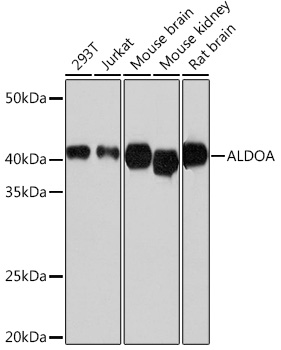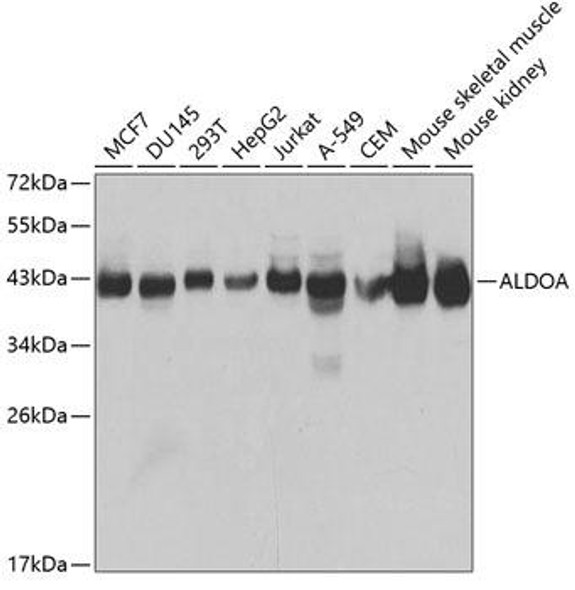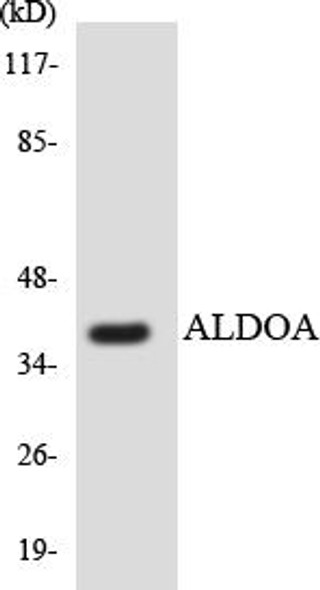Metabolism Antibodies 3
Anti-ALDOA Antibody (CAB11445)
- SKU:
- CAB11445
- Product Type:
- Antibody
- Reactivity:
- Human
- Reactivity:
- Mouse
- Reactivity:
- Rat
- Host Species:
- Rabbit
- Isotype:
- IgG
- Antibody Type:
- Monoclonal Antibody
- Research Area:
- Metabolism
Description
| Antibody Name: | Anti-ALDOA Antibody |
| Antibody SKU: | CAB11445 |
| Antibody Size: | 20uL, 50uL, 100uL |
| Application: | WB IHC |
| Reactivity: | Human, Mouse, Rat |
| Host Species: | Rabbit |
| Immunogen: | A synthesized peptide derived from human Aldolase |
| Application: | WB IHC |
| Recommended Dilution: | WB 1:500 - 1:2000 IHC 1:50 - 1:200 |
| Reactivity: | Human, Mouse, Rat |
| Positive Samples: | 293T, Jurkat, Mouse brain, Mouse kidney, Rat brain |
| Immunogen: | A synthesized peptide derived from human Aldolase |
| Purification Method: | Affinity purification |
| Storage Buffer: | Store at -20°C. Avoid freeze / thaw cycles. Buffer: PBS with 0.02% sodium azide, 0.05% BSA, 50% glycerol, pH7.3. |
| Isotype: | IgG |
| Sequence: | Email for sequence |
| Gene ID: | 226 |
| Uniprot: | P04075 |
| Cellular Location: | Cytoplasm, I band, M line, myofibril, sarcomere |
| Calculated MW: | 39kDa |
| Observed MW: | 39KDa |
| Synonyms: | ALDA, GSD12, HEL-S-87p |
| Background: | The protein encoded by this gene, Aldolase A (fructose-bisphosphate aldolase), is a glycolytic enzyme that catalyzes the reversible conversion of fructose-1, 6-bisphosphate to glyceraldehyde 3-phosphate and dihydroxyacetone phosphate. Three aldolase isozymes (A, B, and C), encoded by three different genes, are differentially expressed during development. Aldolase A is found in the developing embryo and is produced in even greater amounts in adult muscle. Aldolase A expression is repressed in adult liver, kidney and intestine and similar to aldolase C levels in brain and other nervous tissue. Aldolase A deficiency has been associated with myopathy and hemolytic anemia. Alternative splicing and alternative promoter usage results in multiple transcript variants. Related pseudogenes have been identified on chromosomes 3 and 10. [provided by RefSeq, Aug 2011] |
| UniProt Protein Function: | ALDOA: a glycolytic enzyme that catalyzes D-fructose 1,6-bisphosphate -> glycerone phosphate + D-glyceraldehyde 3-phosphate. Three forms of aldolase are found in vertebrates - aldolase A in muscle, aldolase B in liver and aldolase C in brain. |
| UniProt Protein Details: | Protein type:Carbohydrate Metabolism - glycolysis and gluconeogenesis; EC 4.1.2.13; Carbohydrate Metabolism - fructose and mannose; Lyase; Carbohydrate Metabolism - pentose phosphate pathway; Mitochondrial Chromosomal Location of Human Ortholog: 16p11.2 Cellular Component: I band; extracellular space; membrane; extracellular region; M band; cytosol; nucleus; actin cytoskeleton Molecular Function:tubulin binding; identical protein binding; protein binding; cytoskeletal protein binding; fructose-bisphosphate aldolase activity; actin binding Biological Process: platelet activation; striated muscle contraction; glycolysis; glucose metabolic process; actin filament organization; pathogenesis; protein homotetramerization; gluconeogenesis; muscle maintenance; regulation of cell shape; fructose 1,6-bisphosphate metabolic process; platelet degranulation; ATP biosynthetic process; carbohydrate metabolic process; blood coagulation; fructose metabolic process Disease: Glycogen Storage Disease Xii |
| NCBI Summary: | The protein encoded by this gene, Aldolase A (fructose-bisphosphate aldolase), is a glycolytic enzyme that catalyzes the reversible conversion of fructose-1,6-bisphosphate to glyceraldehyde 3-phosphate and dihydroxyacetone phosphate. Three aldolase isozymes (A, B, and C), encoded by three different genes, are differentially expressed during development. Aldolase A is found in the developing embryo and is produced in even greater amounts in adult muscle. Aldolase A expression is repressed in adult liver, kidney and intestine and similar to aldolase C levels in brain and other nervous tissue. Aldolase A deficiency has been associated with myopathy and hemolytic anemia. Alternative splicing and alternative promoter usage results in multiple transcript variants. Related pseudogenes have been identified on chromosomes 3 and 10. [provided by RefSeq, Aug 2011] |
| UniProt Code: | P04075 |
| NCBI GenInfo Identifier: | 113606 |
| NCBI Gene ID: | 226 |
| NCBI Accession: | P04075.2 |
| UniProt Secondary Accession: | P04075,Q6FH76, Q6FI10, Q96B15, Q9BWD9, Q9UCN2, B4DXI7 |
| UniProt Related Accession: | P04075 |
| Molecular Weight: | 364 |
| NCBI Full Name: | Fructose-bisphosphate aldolase A |
| NCBI Synonym Full Names: | aldolase A, fructose-bisphosphate |
| NCBI Official Symbol: | ALDOA |
| NCBI Official Synonym Symbols: | ALDA; GSD12; HEL-S-87p |
| NCBI Protein Information: | fructose-bisphosphate aldolase A; muscle-type aldolase; lung cancer antigen NY-LU-1; fructose-1,6-bisphosphate triosephosphate-lyase; epididymis secretory sperm binding protein Li 87p |
| UniProt Protein Name: | Fructose-bisphosphate aldolase A |
| UniProt Synonym Protein Names: | Lung cancer antigen NY-LU-1; Muscle-type aldolase |
| Protein Family: | Fructose-bisphosphate aldolase |
| UniProt Gene Name: | ALDOA |
| UniProt Entry Name: | ALDOA_HUMAN |




![ALDOA Monoclonal Antibody [PAT3F9AT] (CPAB0196) ALDOA Monoclonal Antibody [PAT3F9AT] (CPAB0196)](https://cdn11.bigcommerce.com/s-rd6ounxcu2/images/stencil/590x590/products/58422/63604/aldoa-monoclonal-antibody-pat3f9at-cpab0196__57855__66133.1706535005.jpg?c=1)


